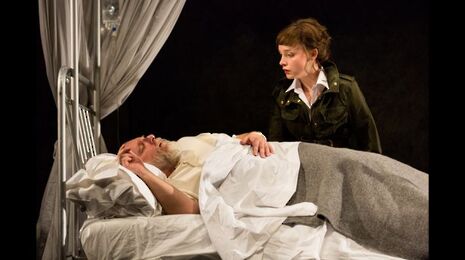Theatre: King Lear
Becky Rosenberg examines the National Theatre’s latest production in light of two previous Lears.

King Lear is often considered Shakespeare’s darkest tragedy. Replete with familial dissent, death, torture and madness, the play makes for harrowing viewing. The titular leader has been played by thespian greats such as Laurence Olivier in the 80s and, more recently, Sir Ian Mckellen in Trevor Dunn’s RSC production. This season the gauntlet has been passed to Simon Russell Beale under the direction of Sam Mendes.
While Olivier created an early Bronze Age piece, complete with omnipresent mist and scenes foregrounded by Stonehenge, and Dunn created a Ruritanian nineteenth-century piece with added theatrical flourishes and religious overtones, Mendes brings the play into an unknown twentieth-century military dictatorship. In contrast to Olivier and McKellen’s tall, imperious figures, Beale cuts a short, rotund pit-bull of a leader. He throws over tables and chairs when Cordelia refuses to laud him then forces her to stand on a chair when her suitors arrive. Rather than rage or criticise, he humiliates her in front of his audience of family and followers. He later performs the same dance by mocking Goneril in front of his group of hyper-masculine, military-clad knaves.
Soldiers dominate many scenes in the play by lining the circular stage, encasing the protagonists and the drama within sterile war chambers or abandoned grand houses. Their absence during Lear’s period of madness renders these scenes even more desolate and lonely. The ultimate scene before he escapes sees Lear sitting down on the pedestal of a Soviet-esque statue of himself while his daughters look on in contempt. He is a diminished man, and this juxtaposition pre-empts his subsequent descent into madness. The epic storm scene epitomises the ravaged picture of a man who has lost everything.
Beale’s mad Lear is maniacal: laughing in one moment, beating a man to death in the next. While McKellen famously went naked on stage and Olivier totes flower chains, Beale strips to a vest and underwear, later wanders around in a hospital gown, and, after being cornered by Cordelia’s medical staff, is placed in a straitjacket and sedated.
During Lear’s insanity, his daughters Goneril and Regan transform into deliciously Machiavellian villains. In contrast to the dowdy, wailing depictions in the abovementioned versions of the play, the sisters are flirtatious master-manipulators who relish the chaos. Anna Maxwell Martin’s Regan laughs when her husband gouges out Gloucester’s eyes. And even Cordelia is a far cry from the child-like innocents usually portrayed – here she is a determined leader.
Edmund also becomes a pseudo-dictator; the frustrated underdog secretly harbouring political machinations that transform him into a cocksure lothario. Edgar usually does not have such a character arc, but here the audience sees a drink-toting bum turn into loyal son, a key force in bringing down Edmund, and the last man standing, as he delivers the final emotive speech in a room littered with bodies.
This production of King Lear is a picture of the toxic effects of power and pride upon individuals as well as families. Mendes has succeeded in creating an arresting political thriller that brings this dark tragedy into a dystopian world of dictators and despots.
King Lear is sold out at the National Theatre until March 25. Tickets for performances from April 11 go on public sale on February 14.
 News / CUP announces funding scheme for under-represented academics19 December 2025
News / CUP announces funding scheme for under-represented academics19 December 2025 News / SU reluctantly registers controversial women’s soc18 December 2025
News / SU reluctantly registers controversial women’s soc18 December 2025 News / Cambridge welcomes UK rejoining the Erasmus scheme20 December 2025
News / Cambridge welcomes UK rejoining the Erasmus scheme20 December 2025 Features / Should I stay or should I go? Cambridge students and alumni reflect on how their memories stay with them15 December 2025
Features / Should I stay or should I go? Cambridge students and alumni reflect on how their memories stay with them15 December 2025 Film & TV / Timothée Chalamet and the era-fication of film marketing21 December 2025
Film & TV / Timothée Chalamet and the era-fication of film marketing21 December 2025









